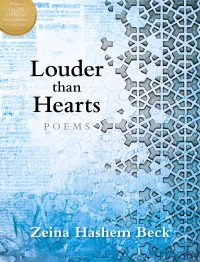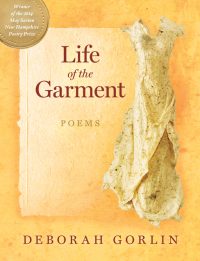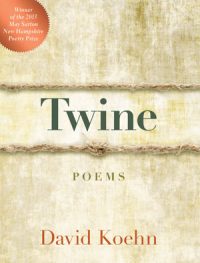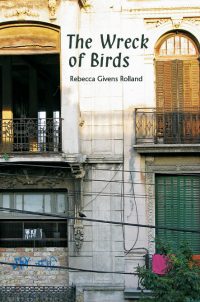
Previous May Sarton NH Poetry Prize Winners
The 2025 May Sarton New Hampshire Poetry Prize Winner
In a literary moment when so much lyric poetry seems preoccupied with private experience and ready-made epiphany, Hugo Dos Santos’s Reduction in Force is revelatory. It is, yes, an examination of the self, but it performs its review through lenses and landscapes that are rarely utilized in poetry, which is to say the cold and bureaucratized reality of the American corporate world, and the ways that world can affect and pressure the individuals and families who attempt to build their lives under the dominion of those companies. Dos Santos maps the experience of a true believer who must come to terms with the betrayal now inherent in what used to be known as the American dream and work through the humiliation of starting over. He does so in poems that are consistently surprising in content, satisfyingly varied in form and tone, and utterly, winningly, trustworthy to the reader. I haven’t seen anything like this book before, and it heralds the arrival of an original poet, with the promise of more originality and excitement ahead.
——Anthony Walton, judge, The May Sarton New Hampshire Poetry Prize.
The 2024 May Sarton New Hampshire Poetry Prize Winner
In death is a mariachi marcy rae henry’s speaker roams from New Orleans to New Delhi in death is a mariachi, a raw yet nuanced exploration of the shifting nature of identity, spirituality, and place. Reckoning with death through the lens of Buddhist ideology, the speaker technicolors her world: a blue-green whiptail lizard reproduces through parthenogenesis, golden oil glistens in petrichor, even the morphine in a grandmother’s IV takes on a kaleidoscopic sheen. Henry engages texts from 1970’s electronica to molcajetes and tejolotes this intersectional, eco-feminist exploration of the body and the soul, their limits, and their excesses. In her formally inventive and full-throated debut, Henry sings of the liminal, of the “soul separating from skin,” of words that are “useful as bones.” The speaker names what she sees and lets it go. She never tells anyone that she’s time travelling.
—Dorsey Craft, judge, May Sarton New Hampshire Poetry Prize
and author of A Brief History of Accidental Inventions and Plunder
The 2023 May Sarton New Hampshire Poetry Prize Winner
“Open Auguries and Divinations, and what we notice at once is the primary, confident appeal of the poet’s voice. Heather Treseler is compelling. We immediately want to listen to her, the way we might listen to a lyric singer full of melody and rhythm that we encounter unexpectedly on a street corner. Her voice brims with harmonies and modulated tones. But make no mistake, running through all her lyricism is a staring, unblinking intelligence that informs us about what she sees, what she celebrates, about those events that trigger her skepticism, and those for which she reserves her frank anger and objection. Her great theme centers on the surprises, good and bad, inherent in intimate relationships. Her experience ranges from suburban sexual assaults and, in The Lucie Odes, repeated male sexual violence and intimidation. But with equal conviction she registers the strains and stresses of friendship, and in “Louisiana Requiem” imagines the emotional divisions of a close friend who cares for her dying mother in hospice while she is herself pregnant, and thus about to become a mother herself. The poet teases out complicated, ardent allegiances. She is in conversation with Anne Sexton, Maxine Kumin and Catullus, of all people, and shares her passionate knowledge with Frank Bidart. Likewise, she is attentive to the subtleties and glories of her own intimate partnerships. Her vision is inclusive, generous, wide-ranging, and enthralling. Here, taken as a whole, we have a tremendously wise and wonderful new collection of poetry.”
—Brad Crenshaw, author of My Gargantuan Desire, Genealogies, and Memphis Shoals, judge of the 2023 May Sarton New Hampshire Poetry prize.
The 2022 May Sarton New Hampshire Poetry Prize Winner
Receipt for Lost Words is a mother’s reconciliation for a child who cannot, speak. It’s an accounting that Catherine Arnold renders in breathtakingly moving, spaced-apart phrases, little gasps of insight into a parent’s heartbreak, bafflement, and isolation.
“Nature now is what I see through glass.”
And, if we hold our breath through desperate parental denial and efforts to “word the silence,” we
release it when Stella—the one who cannot speak—makes her presence known.
“the strong unhurried length of me/ I am Stella.”
The spare, sensual language of Stella’s point of view stuns—as in this description of her father.
“a big thirsty shape/ the hum of him”
What emerges is a new sense of the world, a magic and fairy-tale shift, in which
“…everything/which seemed to matter before/has been forgotten.”
Catherine Arnold has accomplished nothing less than the embodiment, in words, of wordlessness. A moving receipt for what has been lost.
Catherine Arnold grew up in England and, having fallen in love with painting, moved to the US to study at The School of the Art Institute of Chicago. After graduating, she exhibited and taught widely, and received awards from The Royal Academy of Arts, Skowhegan School of Painting and Sculpture, Flintridge Foundation and The Ludwig Vogelstein Foundation. While making her living as an artist, she also wrote, torn between the equally seductive demands of words and color. Over the years, the need to write became increasingly urgent. Her poems and prose have appeared in The Cincinnati Review, The Gettysburg Review, Natural Bridge, and Prairie Schooner, among other publications. She lives in Pennsylvania.

Receipt for Lost Words, the 2022 May Sarton New Hampshire Poetry Prize winner, is a mother’s attempt to understand a world in which her child does not, cannot speak. It’s an accounting that Catherine Arnold renders in breathtakingly moving, spaced-apart phrases, little gasps of insight into a parent’s heartbreak, bafflement, and isolation. Catherine began to write these poems in response to her daughter’s mysterious loss of speech. She felt compelled to explore what had happened, to try to find a way to make it bearable. One poem became two, then three—before long, she’d produced a complete manuscript. The collection went through many revisions, developing in surprising, sometimes painful ways. The poems are about loss, grief, joy, and love. They are about the myths and realities of maternal love; they’re an examination of language, its force and its limits.
The 2021 May Sarton New Hampshire Poetry Prize Winner
From the judge:
When faced with the daunting task of choosing one winner out of more than 430 manuscripts submitted for the May Sarton New Hampshire Poetry Prize, what does one look for? A first poem that hooks you and pulls you in—and then poem after poem that refuse to let you stop reading. A mastery of craft. Music. An undulating urgency of tone that leaves no doubt about the emotional impulse that drives the work. A voice that you trust, even when the syntax or the material is difficult. And that material needs to feel relevant, of substance, necessary. Not a Soul But Us is an achievement on every front. Set in rural England during and after the bubonic plague pandemic of 1348-49, this verse novel drives to the heart of what we humans are capable of when boiled down to our very core in the struggle to survive—and how, in more ways than one, it’s not our intelligence or our resiliency, but love and the non-human animals that save us. Timely, remarkable, and unforgettable, these eighty-four sonnets are so well crafted that we cease to notice the form, swept away as we are by the current of the story and its song.
—Meg Kearney, author of All Morning the Crows and The Ice Storm and judge of the 2021 May Sarton New Hampshire Poetry Prize

Writer and clinical psychologist, Washington, DC

In mid-fourteenth century Yorkshire, the plague pandemic wipes out half the inhabitants of a remote village. Left behind is a twelve-year-old shepherd boy, who with the help of his dog survives near-starvation and a brutal winter and keeps his flock alive. In the months and years that follow, he struggles to reconnect with the life around him. He tells his story in a sequence of eighty-four sonnets.
The 2020 May Sarton New Hampshire Poetry Prize Winner

Alexa Doran is the author of the chapbook Nightsink, Faucet Me a Lullaby (Bottlecap Press 2019), and is currently a PhD candidate at Florida State University. Her series of poems about the women of Dada, “The Octopus Breath on Her Neck,” was recently released as part of Oxidant/Engine’s BoxSet Series Vol 2. You can also look for work from Doran in recent or upcoming issues of Los Angeles Review, Mud Season Review, Salamander, Pithead Chapel and New Delta Review, among others. She lives with her son in Tallahassee, Florida.
-
 $17.00
$17.00
Judged by Nils Michals.
Witty, inventive, and heartbreaking, DM Me, Mother Darling reminds us that once beyond the wreckage of lost, abandoned lives, something underneath emerges: a voice born from that terrible beauty, one that says,“Now hush—/ not everything above can crush us.”
Judge Nils Michals
The 2019 May Sarton New Hampshire Poetry Prize Winner

Dorsey Craft‘s work has appeared or is forthcoming in Colorado Review, Crab Orchard Review, Greensboro Review, Massachusetts Review, Ninth Letter, Passages North, Poetry Daily, Southern Indiana Review, Thrush Poetry Journal and elsewhere. She holds an MFA in poetry from McNeese State University and a BA in English from Clemson University, and is currently a PhD candidate in poetry at Florida State University. She is also a Poetry Editor for The Southeast Review.
Judged by Deborah Gorlin.
You will love Dorsey Craft’s rollicking persona, Pirate Anne Bonny, who, in this thrilling book of poems, serves up heaps of scintillant treasures from the bottomless trunk of her imagination, wit, and verve. In Plunder, Jack Sparrow has met his match.
Judge Deborah Gorlin
The 2018 May Sarton New Hampshire Poetry Prize Winner

Marilee Richards learned poetry from Charles Entrekin and others after she wandered into a workshop put on by the Berkeley, CA Poet’s Co-op in the eighties while working as an adoption interviewer for Alameda County. Richards attended the workshops for several years prior to the organization dissolving and her move to Arizona in 2001. Her poems have been published in many journals, including The Yale Review, The Southern Review, Rattle, Poetry Northwest, The Journal, and The Sun. She is the author of A Common Ancestor (Hip Pocket Press, 2000), and in 2016 she won the William Matthews Poetry Prize.
Judged by David Blair.
This is a poet with range–sympathies, anger, tragedy, other people, love, humor. . . . Richards writes unsentimental poems that road-trip through our times and look around at who is with us when we stop to fill up our cars at gas stations, [who] has been with us in offices . . . she reminds us of what the country has gained in consciousness and freedom, . . . what sorrows and suicides we have left necessarily behind, as the bus pulls up at the curb in the don’t-you-get-it-yet years we have been motoring through lately.
Judge David Blair
The 2017 May Sarton New Hampshire Poetry Prize Winner

Jen Town’s poetry has appeared in Mid-American Review, Cimarron Review, Epoch, Third Coast, Lake Effect, Crab Orchard Review, Unsplendid, Bellingham Review, and others. Born in Dunkirk, New York and growing up in Erie, Pennsylvania, Town went on to earn her MFA in Creative Writing from The Ohio State University in 2008. She lives in Columbus, Ohio, with her wife, Carrie.
Judged by Jennifer Militello.
The Light of What Comes After offers a sure manifesto against the domestic and cosmetic. Jen Town’s poems are wry and aware; within them, we find dead oregano, girls in pastels, and smoked bees, as well as a speaker calling plaintively: “Hear me. I am / a fraud” as she holds “a plate of cherries / on the verge of rot.” Town’s rich linguistic moments and surprising imagery lend her voice a slant which can seem playful and unafraid, but warning is always stitched just below the surface. This is a writer who knows “Your debts / are more than you’ll ever pay back.”
Judge Jennifer Militello
The 2016 May Sarton New Hampshire Poetry Prize Winner

Zeina Hashem Beck is a Lebanese poet with a BA and an MA in English Literature from the American University of Beirut. Her first collection, To Live in Autumn, won the 2014 Backwaters Prize. It was also runnner-up for the 2014 Julie Suk Award, category finalist for the 2015 Eric Hoffer Awards, and has been included on Split This Rock’s list of recommended poetry books for 2014. Her chapbook, 3arabi Song, won the 2016 Rattle Chapbook Prize; it was selected from 1720 submissions. Another chapbook, There Was and How Much There Was, was a 2016 Laureate’s Choice, chosen by Britain’s Poet Laureate Carol Ann Duffy, and published by smith|doorstop. Her second full-length collection, Louder than Hearts, has won the 2016 May Sarton New Hampshire Poetry Prize.
Judged by Betsy Sholl.
Zeina Hashem Beck’s manuscript, Louder than Hearts, has it all—compelling language and a sense of moral gravitas, personal urgency and the ability to address a larger world with passion and artfulness. These poems are sensual and serious. They have grit and spirit, grief and music. They give us a contemporary woman making her complex negotiations with history and culture in voice that is strong and discerning, God-soaked and edgy, able to carry both loss and beauty, to make music out of personal longing and cultural tragedy. By threading Arabic words throughout the book Hashem Beck creates a meditation on the possibilities and limitations of translation, cultural and linguistic. And yet, how clearly these poems speak to us all. Louder than Hearts is certainly timely in the way it provides a lens through which to see life in the Middle East, and hear the musical mix of English and Arabic. But the poems are also timeless explorations of love and loss, of an individual’s attempt to understand her own intimate experience within the larger context of world events and the spiritual realities that permeate them.
Judge Betsy Sholl
The 2015 May Sarton New Hampshire Poetry Prize Winner

Desirée Alvarez is a visual poet who weaves history and the actual with the miraculous and mythic to form magical-realist compositions addressing human interaction with the natural world. Winner of numerous awards, fellowships, and residencies (from American Academy of Arts and Letters, Poets House, and Yaddo, among others), her poems have appeared in Poetry Magazine, Boston Review, Denver Quarterly, and Prairie Schooner. She received the Glenna Luschei Award from Prairie Schooner, and the Robert D. Richardson Non-Fiction Award from Denver Quarterly. She teaches at New York City College of Technology, CUNY, and the Juilliard School. She received her MFA from School of Visual Arts and a BA from Wesleyan University.
Visit Desirée Alvarez’s website to learn more about her art and writing!
Judged by Mekeel McBride.
These poems often shot shivers up my spine. Some made me cry. This is a book I’ll want to read over and over.
Judge Mekeel McBride
The 2014 May Sarton New Hampshire Poetry Prize Winner

Deborah Gorlin has published in a wide range of journals including Poetry, Antioch Review, American Poetry Review, Seneca Review, The Massachusetts Review, The Harvard Review, Green Mountains Review, Bomb, Connecticut Review, Women’s Review of Books, New England Review, and Best Spiritual Writing 2000.
Before winning the 2014 May Sarton New Hampshire Poetry Prize, Gorlin won the 1996 White Pine Press Poetry Prize for her first book of poems, Bodily Course. Gorlin received her B.A. from Rutgers University and an M.F.A. from the University of California, Irvine. Since 1991 she has taught writing at Hampshire College, where she serves as codirector of the Writing Program. She is also a poetry editor at The Massachusetts Review. Gorlin currently lives in Amherst, MA.
Judged by Gary Margolis.
In Life of the Garment, we find Deborah Gorlin’s felt intelligence, where language locates us in poetry’s true place: history living in the heart. In poem after poem, Gorlin clothes us in her fabric of sung words, with characters unique and familiar to us. Her poems give us facsimiles of love, which comfort and gaze upon us. In reading this fine collection, you will see for yourself.
Judge Gary Margolis
The 2013 May Sarton New Hampshire Poetry Prize Winner

David Koehn has been published in a wide range of journals including The Bitter Oleander, Chain, Diner, Artful Dodge, Painted Bride, Poems and Plays, Permafrost, Aethlon, Calapooya, Birmingham Poetry Review, Wisconsin Review, West Wind Review, Southern Indiana Review, Confluence, Oxford Magazine, Whiskey Island, Snake Nation, Cutbank, Apalachee Quarterly, New Millennium Writings, Euphony, Waterways, Alaska Quarterly, The New England Review, The New York Quarterly, and VOLT. Before winning the 2013 May Sarton New Hampshire Poetry Prize, David Koehn’s poetry and translations were previously collected in two chapbooks, Tunic, (speCt! books 2013) a small collection of some of his translations of Catullus, and Coil (University of Alaska, 1998), winner of the Midnight Sun Chapbook Contest. He has an MFA from the University of Florida, a BA in Professional and Creative Writing from Carnegie Mellon, an M.Ed. (equiv.) from the University of Alaska, and was a Breadloaf Rural Teacher Fellow at Middlebury College’s Breadloaf School of English. He lives with his family in Pleasanton, California.
Judged by Jeff Friedman.
David Koehn’s first book, Twine, never falters—one strong poem after another. This is the work of a mature poet. His use of detail is not only precise and evocative; it’s transformative.
Judge Jeff Friedman
The 2012 May Sarton New Hampshire Poetry Prize Winner

Nils Michals is the winner of the May Sarton New Hampshire Poetry Prize in 2012, and has also written the book Lure, which won the Lena-Miles Wever Todd award in 2004. His poetry has been featured in The Bacon Review, diode, White Whale Review, Bay Poetics, The Laurel Review and Sonora Review. He teaches at the University of Colorado at Boulder.
Judged by Alice B. Fogel.
Nils Michals is alternately healed and wounded by the tension between the timeless machinations of humankind and the modern machinery that lifts us beyond—and plunges us back to—our all-too-human, earthly selves. Supported by minimally narrative, page-oriented forms, his poems transcribe poetry’s intangibles—love, loss, hope, a sense of the holy—in a language located somewhere between devotional and raw, but they mourn and celebrate as much of what is surreal in today’s news as of what is familiar in the universal mysteries . . . Come Down to Earth is a ‘”long villa with every door thrown open.”
Judge Alice B. Fogel
The 2011 May Sarton New Hampshire Poetry Prize Winner

Rebecca Givens Rolland is a speech-language pathologist and doctoral student at the Harvard Graduate School of Education. Her poetry has previously appeared in journals including Colorado Review, American Letters & Commentary, Denver Quarterly, Witness, and the Cincinnati Review, and she is the recipient of the Andrew W. Mellon Fellowship, the Clapp Fellowship from Yale University, an Academy of American Poets Prize, and the Dana Award.
Judged by Walter Butts.
In The Wreck of Birds, the first winner of Bauhan Publishing’s May Sarton New Hampshire Poetry Prize, Rebecca Givens Rolland embraces an assimilation of internal feeling and thought with circumstances of the natural world and the conflicts and triumphs of our human endeavors. Here, we discover a language that seeks to at once replicate and transcend experiences of loss and disaster, and together with the poet “we hope that such bold fates will not forget us.” Even at the speaker’s most vulnerable moments, when “Each word we’d spoken / scowls back, mirrored in barrels of wind” these personal poems insist on renewal. With daring honesty and formal skill, The Wreck of Birds achieves a revelatory otherness—what Keats called the “soul-making task” of poetry.













